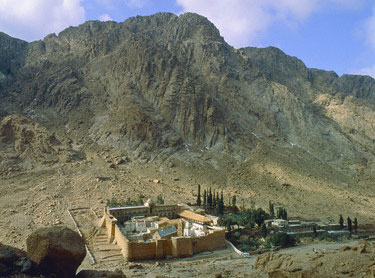March
2009 - Vol. 28

Monastery of St. Catherine,
Mount Sinai, Egypt
The
Ladder of Divine Ascent
wisdom
from John Climacus
The following short
excerpts are from The Ladder of Divine Ascent by John Climacus,
abbot of St. Catherine's Monastery in Sinai, Egypt during the 7th century.
John Climacus is revered in many Eastern churches as a great teacher of
spiritual wisdom. Orthodox monasteries throughout the centuries have read
his Ladder of Divine Ascent during Lent.
Light, fire and flame
Love in its nature makes a human being like God, as far as is possible
for a human being. The soul is intoxicated by the effects of it. Its characteristics
are a fountain of faith, an abyss of patience, an ocean of humility.
Love is the complete repudiation of any unkind thought about one’s neighbor,
since, "Love thinks no evil" (1 Corinthians 13:5).
Love, unchangeable tranquility, and our adoption as children of God
are different from each other only in name. As light, fire and flame are
present in the selfsame operation, so are these three manifestations of
the Spirit.
When someone is completely permeated with the love of God, the brightness
of his soul is reflected by his whole personality as if in a mirror.
Therefore the one who loves God also loves his brother or sister. Indeed,
the second love is the proof of the first.
Poison in your
heart: the memory of insults
The memory of insults is the residue of anger. It keeps sins alive,
hates justice, ruins virtue, poisons the heart, rots the mind, defeats
concentration, paralyzes prayer, puts love at a distance, and is a nail
driven into the soul.
If anyone has appeased his anger, he has already suppressed the memory
of insults, while as long as the mother is alive the son persists. In order
to appease the anger, love is necessary.
Remembrance of Jesus’ passion will heal your soul of resentment, by
making it ashamed of itself when it remembers the patience of the Lord.
Some people have wearied themselves and suffered for a long time in
order to extract forgiveness. By far the best course, however, is to forget
the offences, since the Lord says: "Forgive at once and you will be forgiven
in generous measure" cf. Luke 6:37-38.
Forgetting offences is a sign of sincere repentance. If you keep the
memory of them, you may believe you have repented but you are like someone
running in his sleep.
Let no one consider it a minor defect, this darkness that often clouds
the eyes even of spiritual people.
Repentance, baptismal
renewal, daughter of hope
Nothing equals or excels God's mercies. Therefore, he who despairs
is committing suicide. A sign of true repentance is the acknowledgment
that we deserve all the afflictions, visible and invisible, that come upon
us, and ever greater ones.
Repentance is the renewal of baptism. Repentance is a contract with
God for a second life. A penitent is a buyer of humility.
Repentance is the daughter of hope and the renunciation of despair.
Repentance is reconciliation with the Lord by the practice of good deeds
contrary to the sins. Repentance is purification of conscience. Repentance
is the voluntary endurance of all afflictions.
Hypocrisy and
lies, mother and daughter
Fire is produced from stone and steel; lying comes from loquacity and
gossip. And the lie destroys love.
No one who has any sense would say that telling lies is not an important
sin. The Holy Spirit has severely condemned it. "You destroy those that
speak lies," says David to God ( Psalm 5: 7).
The mother of lying is hypocrisy, mother and also, often, its substance
as well. Hypocrisy in fact works out the lie beforehand and then puts it
into practice.
Those who possess the fear of God are the furthest from telling lies,
because they have an honest judge, their own conscience.
As with all the passions, we ought to recognize various types of lying
according to the damage done. One person tells lies from fear of punishment;
another when no danger is threatening; another because of conceit; another
for enjoyment; another to raise a laugh; and yet another to do harm to
his neighbor.
A child does not know what a lie is, so his soul is free of malice.
Someone who is elated with wine speaks the truth on all subjects, even
without meaning to. In the same way, anyone who is inebriated with the
spirit of penitence will never be able to tell lies.
Do not give up,
but stand courageously
Let us charge into the good fight with joy and love without being afraid
of our enemies. Though unseen themselves, they can look at the face of
our soul, and if they see it altered by fear, they take up arms against
us all the more fiercely. For the cunning creatures have observed that
we are scared. So let us take up arms against them courageously. No one
will fight with a resolute fighter.
Do not be surprised that you fall every day; do not give up, but stand
your ground courageously. And assuredly, the angel who guards you will
honor your patience.
He who really keeps account of his actions considers as lost every day
in which he does not mourn, whatever good he may have done in it.
I consider those fallen mourners more blessed than those who have not
fallen and are not mourning over themselves; because as a result of their
fall, they have risen by a sure resurrection.